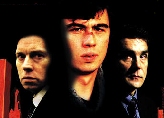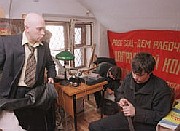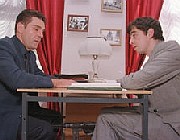 | | Brat 2: In praise of the nation |
Oh Brother!
Aleksei Balabanov's
Brat 2
Andrew James Horton
The very idea of Russian director Aleksei Balabanov—whose oeuvre up to now has been characterised by a series of deft leaps between contrasting genres, spanning both art house and mainstream styles—doing a sequel is something of a novelty. However, the success of his popular gangster flick Brat (Brother, 1997) has now inspired him to do what previously has been unthinkable and make a film which uses the same subject matter as one of his previous works. Forming a paradox that only Balabanov could manage, Brat 2 (2000) is, in fact, the only film which does not quite fit in with Balabanov's filmography, and for fans of the director's quirky offbeat style it represents a worrying departure.
Killer nerd
The original Brat charted the fortunes of Danila, a geeky-looking youth who has just finished his national service, arriving in St Petersburg in search of his brother, Viktor, a hitman known as "the Tartar." Defying appearances, Viktor wusses out of a contract while Danila takes over and proceeds to knock off the local mafia with his own brand of laid-back philosophising about helping one another and a disconcerting array of guerrilla fighting tactics for one who repeatedly claims he was just a desk clerk during the Chechen war. The film ends with him hitching off on the road to Moscow with a bundle of dosh under his arm.
Brat 2 catches up with Danila's exploits in Moscow. This time, we learn more about the true role he played in the war and meet some of his battle comrades, one of whom, Mitya, has a brother in a spot of bother with a dodgy contract drawn up to handle his earnings for a Chicago ice-hockey team. "I can't let my brother down," says Mitya in one of hundreds of references to fraternal support throughout the film, and he promptly gets killed for his concern, as it jeopardises an international Mafia deal.
 | | Making base in a national icon | In Danila's books, sticking by your old battle colleagues is just as important as not letting your brother down, and so off he goes in search of the man responsible. Belkin, a Moscow mafioso who employed Mitya, manages to persuade Danila that his hands are clean and that he should look to America for the culprit. With the aid of Viktor and a machinegun "from Chapayev's time," Danila evades the baddies and travels to Chicago to track down his man and right all wrongs.
Losing the plot
As is the way with sequels, Brat 2 is a far less satisfying film than the original. Much of the charm of the original was the joke that someone who looked so young and totally nerdish could outwit the entire St Petersburg underworld, a point underlined by Danila's continual insistence he did nothing during the war. Sergei Bodrov, who plays Danila, is now three years older and, at the age of 29, has lost a fair bit of the youthful gawkiness which drove the underlying humour of the original.
Furthermore, Viktor is reduced to the role of a buffoon in a shallow attempt to inject some light moments into the film, thus following the trend of Balabanov to make progressively less and less use of the considerable acting talents of Viktor Sukhorukov with each film he makes.
 | Belkin reveals all: A gun to the
testicles often aids the memory | That is not to say that the film is totally devoid of fine performances. Viktor Makovetsky is compelling as marked mafia man Belkin. But Belkin does not really have a coherent part in the plot to play, and is more of less totally written out of the film when the film's action switches to the US. This is all the more curious since Belkin is the man ultimately responsible for Mitya's death, which gets strangely forgotten as the messy plot unravels into a bundle of loose ends.
Nor is Belkin the only character who suffers in this way. The inclusion of pop tart Irina Saltykova and investigative news reporter Lisa Jeffry (both playing themselves) is particularly gratuitous and unnecessarily weighs the story down with more subplots than Balabanov can keep under control. This is in marked contrast to Balabanov's earlier films, including the original Brat, in which the pacing is smooth and even quite large numbers of subplots (especially in Pro urodov i liudei / Of Freaks and Men, 1998) are kept under control and brought to a conclusion.
Right turn
These faults in the construction of the film, though, are minor compared to the direction Balabanov's thinking is now headed. The central thesis of the film, as expressed in the title, is fraternity, in both a literal and a national sense. Although much of the film is set in America, Brat 2 is never anything but a film about Russia, "Russian-ness" and the bonds between Russians; it is this that makes Brat 2, the first Balabanov film to not be consciously about St Petersburg, the odd-one-out in the director's career.
The love between ones own countrymen is so important to Balabanov that it transcends all other distinctions. The real crime of Belkin and Mennis is not their contempt for the rule of law but that they betray a "brother" who has put his trust in them.
Interesting in this light is the positive treatment of those who respect the fraternal/national bond. Particularly of note is the character called "Fascist," a Neo-Nazi arms dealer from whom Danila buys guns and ammunition. Fascist, whose armoury is decked out in swastikas, is just as interested in brotherhood as Danila and tells him an old Nazi proverb about it to make his point.
Right-wing (or at the very least colonial) views also come from Dasha, a Russian prostitute working in Chicago, who is befriended by Danila. Following
an argument with some Afro-Carribeans which mystifies Danila, she explains to him that blacks have a spirit which is closer to nature. The tone of her voice is certainly admiring as she says this, but at the same time it is suspiciously close to the fascist notion of the "noble savage," a concept which implies a distinct racial hierarchy. Danila, meanwhile, looks on with a complete lack of comprehension at these people, and he certainly has little sympathy for them.
This sits disturbingly next to previous portrayals by Balabanov of outsiders in Russia. The Germanic influence seems to get the thumbs up in Schastlive dni and the original Brat, but in the latter film one character is quick to express his contempt for the Jews.
It seems unlikely that Balabanov is trying to act as an impartial documenter of the social attitudes that prevail in contemporary Russian society—Brat 2 is far too cheap, sensational and populist a film for that approach to be valid. Moreover, Brat 2 is unmistakably a film which is trying to preach a message, hardly a stance compatible with neutral depiction of these racial attitudes.
If Brat 2's patronising and "colonial" attitude to blacks is dubious, the film's Russian-language website spells out Balabanov's attidude plainly on a page entitled (in English) "Black & White". Under the pretext of attacking "political
correctness" it basically describes how, in the USA, white people are
terrified of blacks but are completely unable to do or say anything about it
for fear of being labelled racists. As the height of absurdity, they give the
example that Americans can't say "watermelon" any more because, apparently,
that was once a slang term for negroes. Balabanov himself is quoted as saying: "There are a lot of drug dealers amongst the blacks, they are on social security, they don't want to work." [1] and at the beginning of the "discussion" Bodrov opines:
The negro problem [sic] is a taboo subject which it
is not acceptable to speak out loud about. These days, black people have a huge advantage when looking for a job: if a black person and a white
person go for a job at the same time, the black person will always get it.
The employer is simply too afraid of being accused of racism.[2]
...among other prime quotes which display the fundamental racism of the film's makers. [3]
The triumph of man, the triumph of nation
 | | Balabanov reverts to voyeurism | It's also worth noting Balabanov's increasing misogyny. A revealing representation in Brat 2 is the giggling young naked girls in the sauna, hurrying to wrap themselves in blankets (not quite successfully hiding their bodies from the camera as they do so) and then summarily dismissed by the men who have beer to drink and talking to do. The two of the three main female protagonists (Saltykova and Jeffry) are weak and unconvincing characters, mainly written in for Danila to sexually conquer.
The third main female character is also written in for Danila to conquer, although not sexually. Whilst the film does imply that their relationship might develop in that direction, the real conquest is a nationalist one, with Danila persuading the disillusioned hooker that Russia has more to offer than the United States (indeed, the film was shown at a Canadian festival under the title On the Way Home). The film ends with the two returning home to Russia with a triumphalism usually reserved for films depicting returning war heroes.
And it is this that makes Brat 2 such an odd film. Balabanov has, up to this point, been a director whose view of life has been sardonic, with a philosophy laced with touches of stoicism in the face of life's ardours. Even the original Brat was a tale of some bitterness. Triumphalism is something that has until now been the antithesis of Balabanov's films.
That Balabanov should chose to return to the populism of Brat should not be surprising, given the almost contrived erraticism of his film career. Rather more cause for concern is that Balabanov should be shifting from his position as a chronicler of the underbelly of society to that of demagogue to the mob. Going mainstream has never looked so disturbing.
Andrew James Horton, 5 February 2001
With thanks to James Partridge
Film stills from the Brat 2 website (© STV, 2000).
Brat 2 showed at the 44th London Film Festival
Also of interest:
Retail therapy:
Buy the original Brat (Brother, 1997)
Buy Balabanov's Pro urodov i liudei (Of Freaks and Men, 1998)
Buy other Russian films on VHS
(in both NTSC and PAL formats)
Moving on:
Footnotes:
1. "Среди черных много продавцов наркотиков, они сидят на
социалке, они не хотят работать."
All quotes are taken from the Brat 2 website (operational at the time of writing) and were translated into English by James Partridge.
2. "Проблема черных—табу, о ней не принято вслух говорить. Сегодня черные имеют абсолютное
преимущество при приеме на работу: если одновременно придут наниматься
черный и белый, то однозначно примут негра. Работодател
ь просто побоится
бытьобвинен
ным в расизме."
3. For example, "С точки зрения абстрактной люди все должны быть равны.
Я абсолютно с этим согласен. Но реальность нам показывает, что это не так. И
надо все—таки это как—то отражать и показывать." ("In the abstract sense, all people must be equal. I'm completely in agreement with that. But reality shows us that it isn't like that, and we
must somehow reflect and show that.") and "Альтернативные деньги—так называемые 'Food Stamps'—
продовольственные карточки, бесплатно выдаваемые социальными службами,
позволяют прокормить даже самые многодетные негритянски
е семьи, а они
практически все такие." ("An alternative form of money—so-called 'food
stamps'—given out for free by the social services allows even negro families
with lots of children—and they are practically all like that—to be fed.")
|








